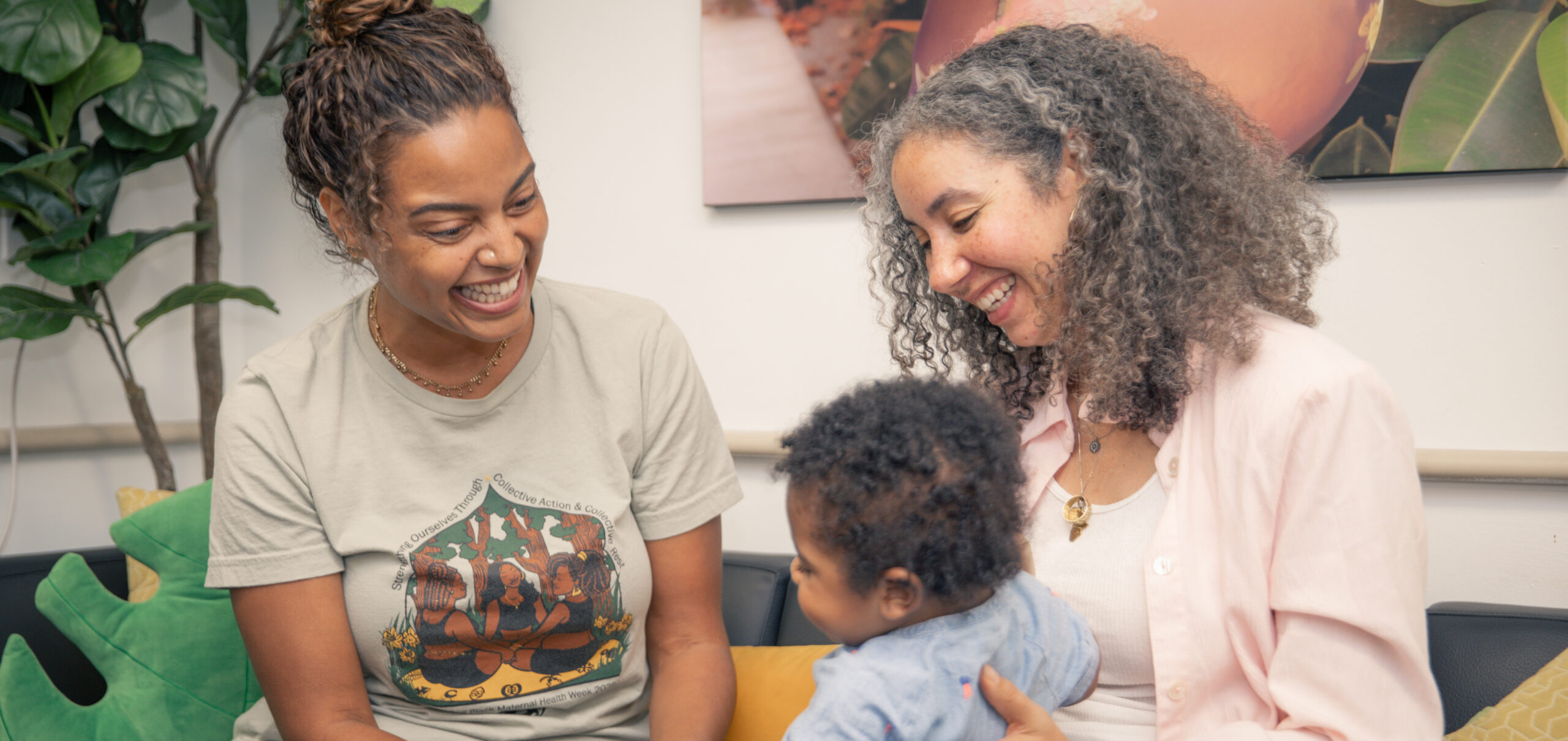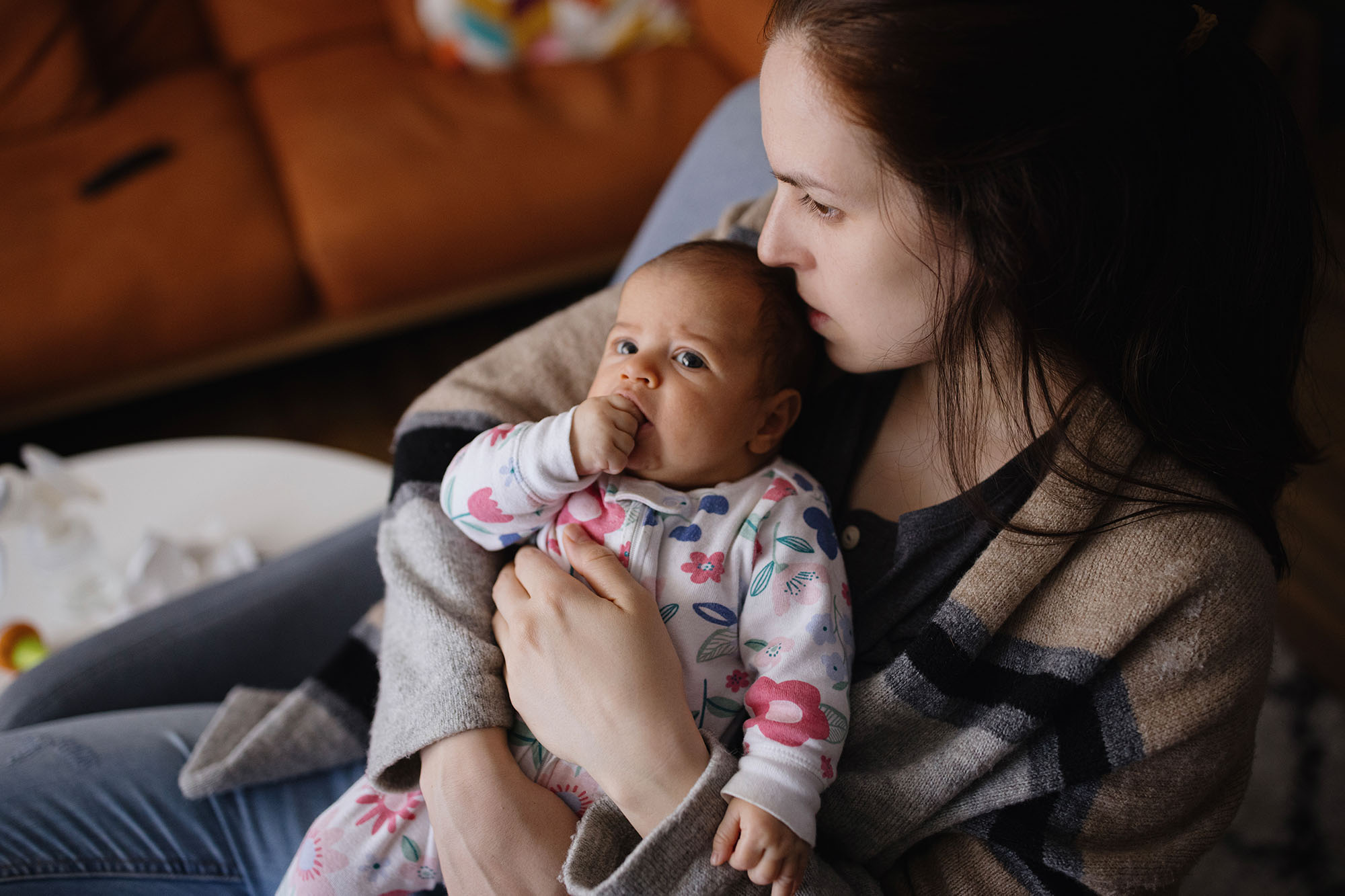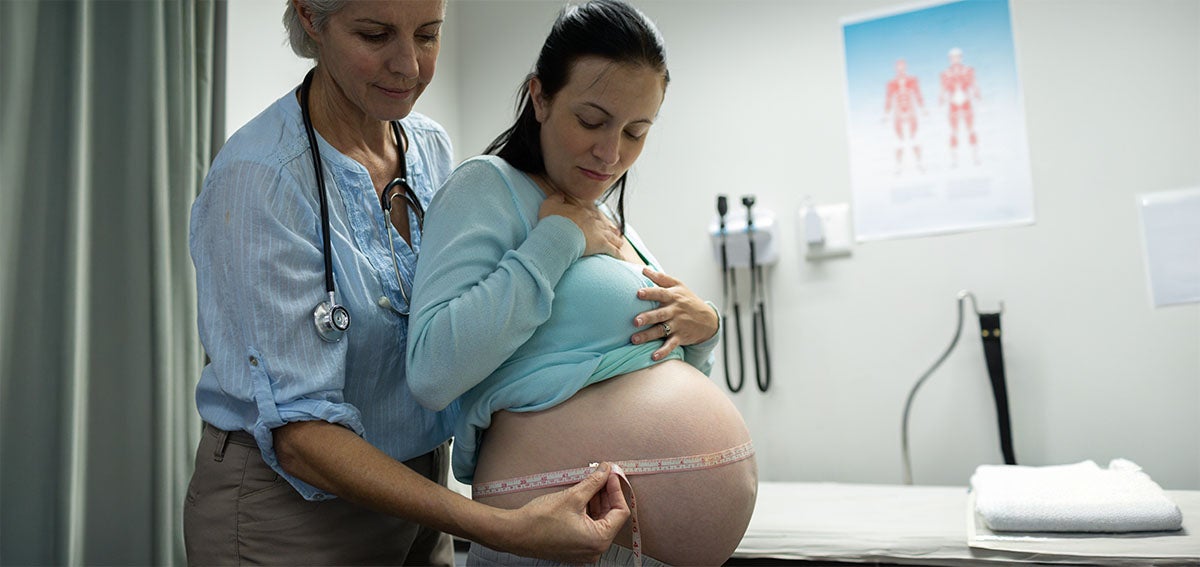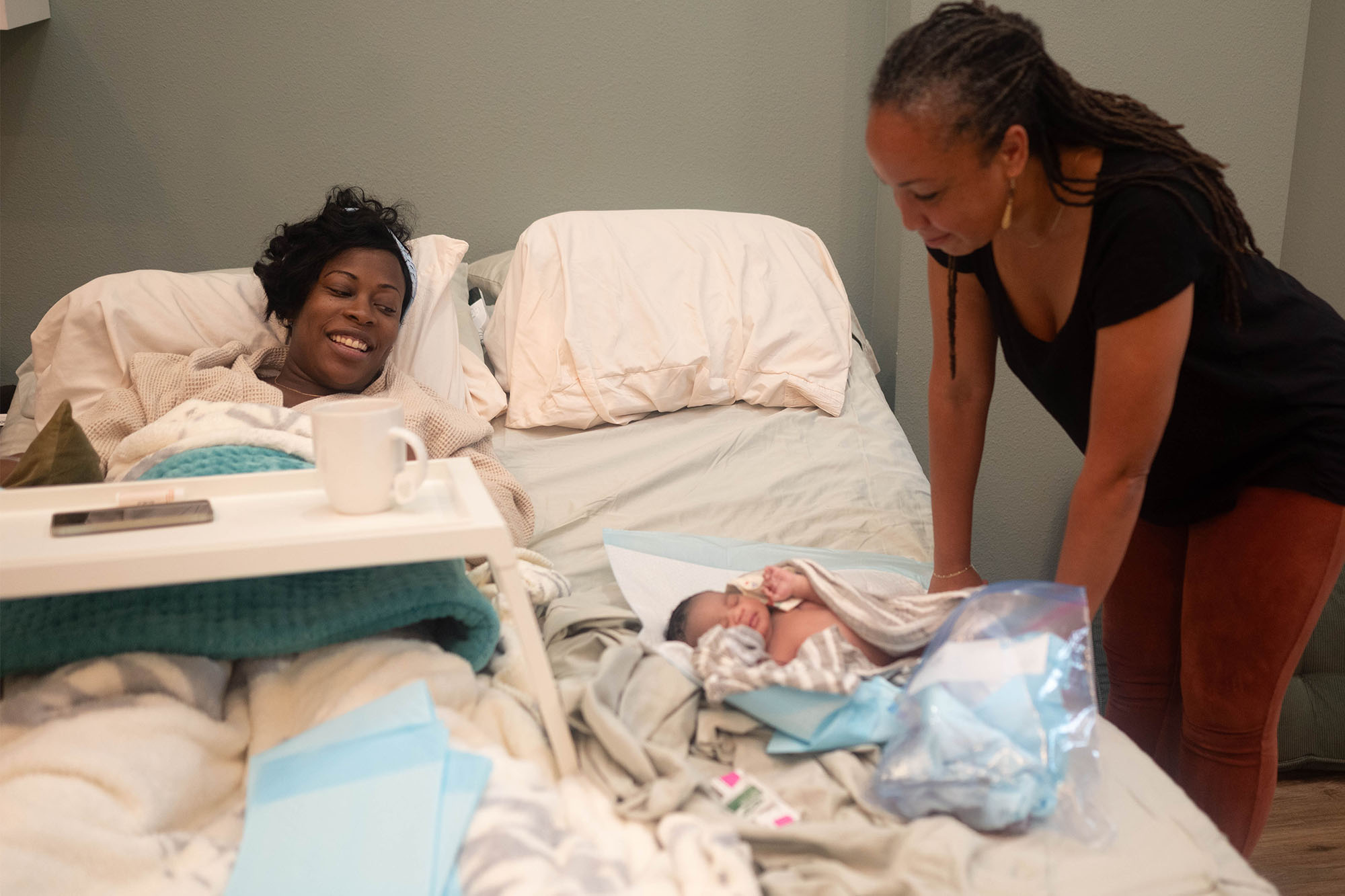Why This Work Matters
In California, as in the US overall, about one in five mothers / birthing people* suffers from maternal mental health (MMH) issues (also known as “perinatal mood and anxiety disorders”), negatively impacting the birthing person and the child. Despite this high prevalence of MMH issues, the overwhelming majority of birthing people experiencing MMH symptoms (75%) do not receive treatment. CHCF is working with partners to better understand this issue and to explore innovative, practical solutions for delivering MMH care to California’s birthing people in need.
MMH conditions are the most common complications of pregnancy and childbirth. They include prenatal and postpartum depression and anxiety, bipolar disorder, and in extreme cases, postpartum psychosis. According to the California Department of Public Health’s Maternal and Infant Health Assessment (MIHA), 21% of pregnant and postpartum birthing people in California are affected. The prevalence is estimated to be even higher in some populations. For example, during pregnancy, maternal depression rates rise to as high as one in two for those on Medicaid. This is significant because Medi-Cal (California’s Medicaid program) covers 45% of the 400,000 babies born in the state annually. Also, in California, Black mothers / birthing people report the highest rates of anxiety and depression, compared to all other races, and anxiety has been found to be more common than depression in the perinatal population. Alarmingly, maternal suicide (PDF) is a leading cause of maternal mortality in the US; it is most common in the White population and almost half occur between six and 12 months postpartum.
Left undetected and untreated, MMH conditions can lead to negative health outcomes for the birthing person as well and negatively affect the mother-child bond and the child’s long-term physical, emotional, and developmental health. Also, there can be significant financial costs of untreated MMH conditions (e.g., more use of emergency care services, higher rates of absenteeism at work) — an estimated $35,000 for each mother–child dyad.
Our Approach
Fortunately, these conditions are treatable, and early detection can make a significant, positive impact. Since 2015 CHCF has funded work to better understand maternal mental health care in California and to explore ways to improve it. A summary of all CHCF-funded projects on this topic is provided below.
Project Highlights
Data/Measures
To improve maternal mental health care, we must know about the health care system’s performance in key areas like health outcomes, patient experience, and equity at baseline and be able to track its progress (or lack thereof) over time. CHCF invests in the development of trusted, reliable, and valid measures; data collection; and reporting.
Read More
- The University of California, San Francisco, and the California Department of Public Health are working together to improve questions about perinatal mental health in the annually fielded MIHA survey and to conduct analyses of these data. (In process)
- The Listening to Mothers in California survey (cofunded with the Yellow Chair Foundation), fielded in English and Spanish by the National Partnership for Women & Families, highlights the attitudes and experiences of mothers around maternity care. A fact sheet on maternal mental health is available. (2018)
- The 2024 Listening to Mothers national and California-specific surveys are underway with CHCF support. (In process)
- The Maternal Mental Health Leadership Alliance (MMHLA) produced a series of fact sheets on maternal mental health to inform key stakeholders and the public. (2022)
- It also convened a group of national experts to develop a framework for deciding when to provide MMH patient education and screening and identified key barriers to implementing the screening framework. MMHLA is now working to address these barriers. (2025)
- Health Affairs released its first-ever special issue on perinatal mental health cofunded by CHCF, the Zoma Foundation, and the Perigee Fund. Health Affairs held a briefing featuring selected authors from the issue who presented their research and took questions. The Alliance for Health Policy also held a briefing to highlight policy levers and promising solutions to reduce and prevent perinatal mental health conditions. (2021)
- In April 2024, Health Affairs published a second theme issue on perinatal mental health. (2024)
- The CHCF Almanac report Maternity Care in California: Delivering the Data provides an overview of the delivery of maternity care in California, including statewide data that relate to maternal mental health. (2023)
- The National Committee for Quality Assurance (NCQA) is exploring the possibility of running a learning collaborative with Medi-Cal managed care plans to share and learn how to populate the behavioral health e-measures now required by the California Department of Health Care Services (DHCS). (2023)
- NCQA developed clinical quality measures for prenatal depression and postnatal depression that have been included in the national Healthcare Effectiveness Data and Information Set and are now required for health plan reporting by DHCS. (2020)
Delivery System Interventions
Providers need assistance to understand, recognize, and effectively respond to maternal mental health issues. CHCF supports on-the-ground efforts to help individual providers and health care systems improve screening for mental health conditions and to try promising approaches for treatment.
Read More
- The Los Angeles Maternal Mental Health Access program is a multiyear effort to implement the Collaborative Care Model for maternal mental health in community clinics in LA. The first three cohorts have been recruited and are engaging. (In process)
- Partners: the Community Clinic Association of Los Angeles County, Concert Health, the Department of Psychiatry and Behavioral Sciences at the University of Washington, Elevation Health Partners, Maternal Mental Health Now, and the University of California Los Angeles
- Participating clinics: AltaMed (Goodrich and West Covina), Clínica Monseñor Oscar A. Romero (Alvarado, Marengo, San Fernando Valley, and Van Nuys), Eisner Health (Panorama City and Van Nuys), St. John’s Community Health (Frayser and Leavey), and TCC Family Health (Artesia and Bellflower)
- To learn more, read a blog post here (How Los Angeles Community Clinics Use the Collaborative Care Model to Improve Maternal Mental Health – California Health Care Foundation) and listen to a webinar here (CIN Webinar– Collaborative Care Model for Perinatal Mental Health)
- The Policy Center for Maternal Mental Health is collaborating with two obstetrics practices in the CommonSpirit Health system to pilot the use of community health care workers to support MMH. (In process)
- The Keck School of Medicine at the University of Southern California (USC) is developing a reproductive life-planning template to be included in psychiatric advanced directives. This effort raises awareness around psychiatric advanced directives as a tool for mitigating health crises and proactively planning for reproductive life decisions among people of child-bearing age with serious mental illness. (2024)
- Maternal Mental Health Now, in collaboration with the UCLA Prevention Center of Excellence, developed two free, sequential, self-paced, online training curricula on perinatal mental health issues for both clinicians and nonclinicians who work with patients during the perinatal period. (2023)
- Maternal Mental Health Now collaborated with Streetwyze to develop an online maternal mental health resource directory of Los Angeles County by leveraging community-sourced knowledge and experience. (2022)
- iDREAM for Racial Health Equity developed a curriculum and model to support Black maternal health providers and community health professionals to address the ongoing strains of the pandemic facing providers in Los Angeles County. The project created space for intergenerational bridge building between Black providers and focused on provider well-being and reducing provider burnout and mental stress. (2022)
- The Hospital Quality Institute, in partnership with Maternal Mental Health Now, led an initiative to help hospital perinatal staff understand, recognize, and effectively respond to mental health issues in the perinatal period. This helped hospitals comply with Assembly Bill 3032, which took effect January 1, 2020, and requires hospitals with perinatal units to educate perinatal providers about maternal mental health conditions and to inform postpartum mothers / birthing people and families about signs and symptoms of these conditions, local post-hospital treatment options, and community resources. (2021)
- Purchaser Business Group on Health developed resources to promote access to and use of certified nurse midwives (CNMs), as well as tools to assist providers in integrating CNMs into their practices. (2020)
- A pilot program run by the Los Angeles County Health Agency and USC tested the use of secure emails in electronic consultations between reproductive psychiatrists and general psychiatrists to improve management of severe and persistent mental illness in pregnant and postpartum mothers / birthing people. (2019)
- In California and across the nation, there is significant interest in provider-to-provider telephone consult programs to improve care for mothers / birthing people with maternal mental health conditions. Lifeline for Moms, which supports the Massachusetts Child Psychiatry Access Program for Moms (a national model), held a webinar highlighting its program and other state-based programs like it. (2019)
- The Institute for Medicaid Innovation identified promising approaches to address maternal depression and anxiety during pregnancy and one year post-birth, with a focus on the Medicaid population. (2018)
- Maternal Mental Health Now tested collaborative maternal mental health care in three Los Angeles community clinics: Harbor Community Clinic, Eisner Pediatric and Family Medical Center, and Martin Luther King Jr. Outpatient Center. (2018)
Payment
How the health care system pays for services is sometimes at odds with achieving high-quality, equitable care. CHCF supports projects that shed light on payment practices and aim to align payment with desired outcomes.
Read More
- Our Roots, a nonprofit venture that providers virtual MMH peer support to mothers and birthing people of color in community health centers, will explore sustainability pathways to serve Medi-Cal members. (2023)
- Along with Zoma Foundation and the Perigee Fund, CHCF funded Mathematica to estimate the total societal cost of maternal mental health issues. Mathematica produced a report sharing the national numbers as well as separate reports for California, Colorado, and Washington State. (2019)
Policy
Policies drive behavior and outcomes in the health care system. CHCF supports research and analysis that informs health care–related policymaking.
Read More
- CHCF and the David & Lucille Packard Foundation supported the California Department of Health Services to develop the Birthing Care Pathway, a comprehensive vision for maternity care in the Medi-Cal program from pregnancy through the first year postpartum. The provision of MMH care and support is noted throughout. (2025)
- The Institute for Medicaid Innovation led work to understand health plans’ implementation of California Assembly Bill 2193 and published its findings in a report (PDF). (2023)
- CHCF and The California Endowment supported the nonprofit 2020 Mom (now the Policy Center for Maternal Mental Health) in spearheading a statewide task force on maternal mental health in California, which produced a report with recommendations. (2017)
Narrative Change
Raising awareness about the common nature of maternal mental health issues is key for reducing stigma and normalizing timely mental health treatment. CHCF invests in projects to open up the conversation about mental health through education and accurate storytelling.
Read More
- The USC Norman Lear Center completed a learning project, funded by CHCF, to demystify impactful narrative change efforts and help funders identify best practices that make such efforts via scripted entertainment more likely to be successful. Using the best practices framework (PDF), the researchers built an interactive prototype that provides information to users in a customized, actionable format. (2025)
- For several years, CHCF funded Hollywood, Health & Society, a program of the USC Norman Lear Center, to provide materials that help screenwriters more accurately depict maternity care on television and in other entertainment programming. (2023)
Innovation Fund Investments
The CHCF Innovation Fund identifies innovative solutions — including maternal mental health solutions — and makes them more available to bring about widespread improvements in our state’s health care system so that all Californians can access the care they need, when they need it.
Read More
- Mahmee is an innovative platform offering comprehensive, high-quality, and culturally responsive perinatal care, including health assessments, lactation aid, nutrition, mental health services, and coordinated care.
- GetWell Docent pairs pregnant people with navigators that help remotely coordinate prenatal and postpartum services, which too often fall through fragmented cracks in the Medi-Cal system.
Other
- CHCF supported the establishment of Funders for Maternal Mental Health, a national network that meets quarterly. (Ongoing)
Also, read about CHCF’s efforts to encourage other funders to support perinatal mental health work. - The RAND Corporation developed and disseminated research briefs to share the findings of the Birth-Centered Outcomes Research Engagement (B-CORE) in Medi-Cal project with key audiences poised to decrease maternal mortality and severe maternal morbidity in Medi-Cal births. (2023)
Learn More
For more information, please contact Stephanie Teleki.
* “Birthing people” is used to recognize that not all people who become pregnant and give birth identify as women or mothers.






